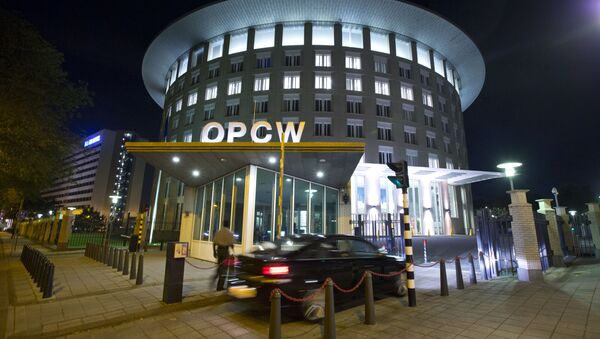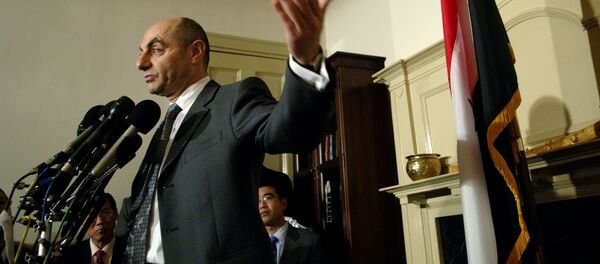Tareq Haddad, a reporter for Newsweek, stated that he has left the organisation over the latter's unwillingness to publish his "newsworthy revelations" about the leaked letter of an OPCW employee concerning a report on the alleged Douma chemical attack in Syria.
I have collected evidence of how they suppressed the story in addition to evidence from another case where info inconvenient to US govt was removed, though it was factually correct.
— Tareq Haddad (@Tareq_Haddad) December 7, 2019
The journalist accused his former employer of acting in a biased way by "suppressing" his story about the leaked letter along with some evidence in another article, which contained "info inconvenient to the US government" despite it being "factually correct", while releasing other stories related to the OPCW probe. A Newsweek spokesperson commented on Haddad’s accusations in response to a Fox News’ request for comment, stating that "the writer pitched a conspiracy theory rather than an idea for objective reporting" and that this pitch was rejected by the outlet’s editors.
Haddad didn't elaborate any further on what information was allegedly muzzled by Newsweek, but announced his intention to publish the full story "shortly". He also showed interest in revealing facts proving that Newsweek had originally supressed the story, but said his former employer threatened him with legal action, citing "confidentiality clauses" in his contract.
I'm sure the character attacks will follow soon but thank you to everyone for the outpouring of support so far. I'm currently working on the piece and hope to have it ready in the next few days. Stay tuned.
— Tareq Haddad (@Tareq_Haddad) December 8, 2019
The reporter said he is currently seeking legal advice on how to proceed and is looking for some kind of "whistleblower protection". He added that at the very least he will publish evidence without "divulging the confidential information".
OPCW Mail Leak
According to Haddad, the story suppressed by Newsweek was supposed to talk about the email from a member of the OPCW fact-finding mission sent to Douma, Syria to determine if prohibited chemical weapons were used in the alleged attack on it by Damascus in April 2018. In this email, published by the whistleblowing website WikiLeaks, the investigator asks the OPCW to publish the unedited version of their report, arguing that it has "morphed into something quite different to what was originally drafted".
The author of the email pointed out that the report didn't contain evidence casting a shadow over accusations that Damascus used a chlorine agent in the attack since residual chemicals could be a part of household chlorine-based bleach and the exposure symptoms, shown on a notorious video published by the terrorist-affiliated White Helmets, didn't correspond with witness testimony.
OPCW distortions: "Crucial facts “...have morphed into something quite different to what was originally drafted.”@LatuffCartoons
— WikiLeaks (@wikileaks) November 24, 2019
Leaked email:https://t.co/Z3N1r0xkZ4 pic.twitter.com/vZ5dMmOgZe
The leaked email also recalled that the fact-finding mission doubted the cylinders, which allegedly contained chlorine gas, were dropped from an aircraft as was claimed by the Syrian opposition, citing damage inconsistent with these claims.
OPCW defended its report, arguing that all the concerns expressed by its employees had been taken into consideration when the organisation drafted the final report.
False-Flag Douma Attack
An investigation into the alleged use of chemical weapons by Damascus was opened in light of the video published by the White Helmets, an NGO often spotted working with Syria-based terrorist groups, and a showing purported chemical gas attack in Douma, Syria on 7 April 2018. The footage showed the White Helmets administering unknown medicine and pouring water on several people at a local hospital, including children to allegedly treat them for the effects of attack.
The video was then broadcast by a majority of mainstream media outlets despite Damascus dismissing it as "staged" and assuring it never used chemical weapons against its own population. The Syrian government recalled that its entire chemical arsenal was destroyed under OPCW supervision after similar accusations were made against Damascus in 2013. However, Damascus could not guarantee that some chemical weapons didn't remain in the hands of armed militant groups and terrorists, who seized and controlled significant parts of the country at the time.
The footage was used by the US, UK, and France to justify massive missile strikes against Syrian military targets, accusing its government of the atrocity despite a preliminary OPCW report not being ready.
The watchdog's report claimed that chemicals were used in the alleged attack, but failed to attribute it to any forces, acting on Syrian territory.
In a stunning revelation preceded by a six-month investigation, BBC Syria producer Riam Dalati stated on 13 February that the White Helmets' video had been staged and that there in fact had been no fatalities in Douma on that day. His investigation also showed that sarin gas was not used in Douma although the producer was not sure about chlorine.






